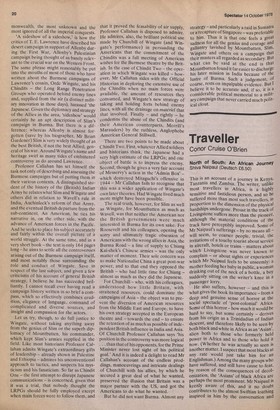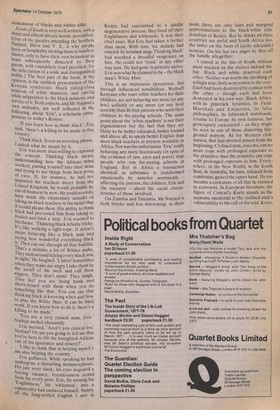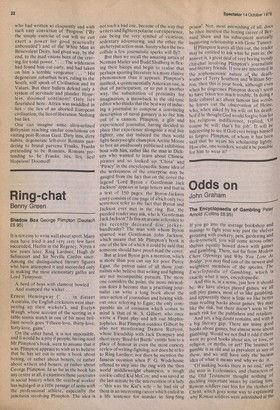,Traveller
Collor Cruise O'Brien
North of South: An African Journey Shiva Naipaul (Deutsch £6.50) This is an account of a journey in Kenya, Tanzania and Zambia. The writer, unlike most travellers in Africa, is a highly sensitive and fastidious person, and so he suffered more than most such travellers, in proportion to the dimension of the physical hardships undergone. Proust in the track of Livingstone suffers more than the pioneer, although the material conditions of the track have perceptibly improved. Some of Mr Naipaul's sufferings — by no means all — will seem, to coarser people, trivial, the irritations of a touchy tourist about service in aircraft, hotels or trains — matters about which Livingstone was never. known to complain — or about sights or experiences which Mr Naipaul feels to be unseemly: a mother feeding her baby in public, a woman drinking out of the neck of a bottle, a boy suddenly sitting on the writer's knee in a passenger lorry. He also suffers, however — and this is what gives the book its importance — from a deep and genuine sense of horror at the social spectacle of 'post-colonial' Africa. Some of this horror — how much it would be hard to say, but some certainly — derives from his origin as a Trinidadian of Indian descent, and therefore likely to be seen by both black and white in Africa as an 'Asian', alien both to those who formerly held power in Africa and to those who hold it SOW. (Whether he was actually so seen is another 'natter. I suspect that most blacks at any rate would just take him for an Englishman.) Among the many groups who have suffered, and still have cause to fear, by reason of the consequences of decol onization, the 'Asians' of black Africa are perhaps the most prominent. Mr Naipaul is keenly aware of this, and it no doubt contributes to the almost Swiftian loathing inspired in him by the conversation and demeanour of blacks and whites alike. North of South is very well written, with a sharp and almost always hostile perception. (One of the puzzles attending the brothers Naipaul, Shiva and V. S., is why Pe°Ple keep on hospitably inviting them to lunch or dinner, only to have their own behaviour as hosts subsequently dissected by their guests, with exquisitely cruel precision, for the delectation of a wide and distinguished Public.) The best part of the book, in my Opinion, is the ruthless presentation of the Kenyan symbiosis: black ruling-class mimesis of white manners, and careful White adaptation to the black mimesis, and service of it. Both aspects, and Mr Naipaul's OW n attitudes, are well reflected in the following, about 'Eric', a scholastic entrepreneur in today's -Kenya: If you learn how to think black', Eric said, 'there's a killing to be made in this country.'
Think black. It was an arresting phraseI asked what he meant by it. Eric was more than willing to expound the concept. Thinking black meant understanding how the African mind worked, putting yourself into their skins and trying to see things from their point of view. If, for instance, he had not imported his teachers direct from the United Kingdom, he would probably be out of business by now. He could so easily have made the elementary mistake of taking on black teachers in the belief that it would please them. His ability to think ; black had prevented him from taking so foolish and fatal a step. Eric warmed to his theme. 'Thinking black is fairly tricky. It's like walking a tight-rope. It doesn't mean behaving like a black man and saying how wonderful everything black is. They can see through all that bullshit. That's a mistake a lot of Whites make, They rush around licking every black arse in sight.' He laughed. 'Listen] Sometimes When they make me angry I take them by the scruff of the neck and call them nigger s . They don't mind. They laugh. They feel you are being frank and above-board with them when you do something like that. You can say that thinking black is knowing when and how to play the White Man. It can be hard work, If you know how to do it, there's a killing to be made.' 'You are a very cynical man, Eric.' Nathan smiled pleasantly. Eric snorted. 'Aren't you cynical too, Nathan? Or are you going to tell me that you're here to lift the benighted African out of his ignorance and misery?'. 'I like to think that in helping myself I am also helping the country.' Eric guffawed. While speaking he had undergone a disturbing metamorphosis. His jaw went slack; his eyes acquired a leering vacancy; licentiousness oozed from his every pore. Eric, by turning his 'Englishness,' his 'whiteness', into a Commodity had enslaved himself. Nearly all the long-settled English I met in Kenya had succumbed to a similar degenerative process: they lived off their Englishness and whiteness. It was their chief asset. But Eric had taken it further than most. With him, the malady had entered its terminal stage.Thinking black' had wreaked a dreadful vengeance on him. He could not 'think' in any other way now. He had gone hopelessly native. Eric was what he claimed to be —the black man's White Man.
This is an impressive perception, but through influenced sensibilities. Well-off Kenyans who want white teachers for their children, are not behaving any more (or any less) selfishly or any more (or any less) sensibly than British parents who send their children to fee-paying schools. The main point about the 'white teachers' is not their pigmentation but the fact that they are likely to be better educated, better trained and above all, to speak better English than most black teachers at present available in Africa. Nor was the unfortunate 'Eric' really behaving any more licentiously (in spite of the evidence of jaw, eyes and pores) than people who run fee-paying schools in England. But in Africa a transaction identical in substance is transformed emotionally by anterior sentiments — affecting the parents, the children, Eric and the narrator — about the racial characteristics of those involved.
On Zambia and Tanzania, Mr Naipaul is both briefer and less interesting: in these lands there are only faint and marginal approximations to the black-white relationships of Kenya. But he thinks all three countries are awful and South Africa too, the latter on the basis of (quite adequate) hearsay. On his last two pages he flies off the handle altogether: I stared at the tins of South African meat stacked on the shelves behind the bar. Black and white deserved each other. Neither was worth the shedding of a single tear: both were rotten to the core. Each had been destroyed by contact with the other — though each had been destroyed in his own way. Black Africa, with its gimcrack tyrannies, its FieldMarshals and Emperors, its false philosophies, its fabricated statehoods, returns to Europe its own features, but grotesquely caricatured — as they might be seen in one of those distorting fairground mirrors. As for Western civilisation, that had aborted almost from the beginning. Civilised man, it seems, can no more cope with prolonged exposure to the primitive than the primitive can cope with prolonged exposure to him. Everywhere, in the New World, in the South Seas, in Australia, his lusts, released from constraint, gained the upper hand. He too became a caricature of all that he claimed to represent. In European literature, the figure of Conrad's Kurtz stands as the supreme memorial to the civilised man's vulnerability to the call of the wild. Kurtz, who had written so eloquently and with such easy conviction of 'Progress' (Ty the simple exercise of our will we can exert a power for good practically unbounded') and of the White Man as Benevolent Deity, had given way, by the end, to the mad visions born of the craving.for total power. . .. The wilderness had found him out early, and had taken on him a terrible vengeance . His degenerate suburban heirs, ruling to the South, still speak of Civilisation and its Values. But their bullets defend only a system of servitude and plunder. Hopeless, doomed continent! Only lies flourished here. Africa was swaddled in lies — the lies of an aborted European civilisation; the lies of liberation. Nothing but lies.
One can imagine some ultra-refined Bithynian reaching similar conclusions on visiting post-Roman Gaul. Dirty inns, dirty habits, degenerate left-over Romans pandering to brutal parvenu Franks, Franks pretending to be Romans, Romans pretending to be Franks, lies, lies, lies! Hopeless! Doomed!




































 Previous page
Previous page